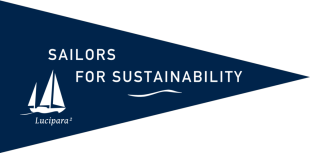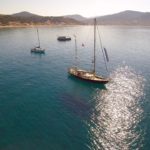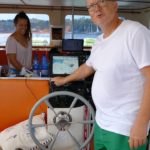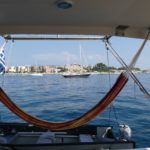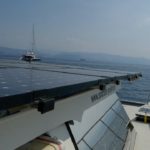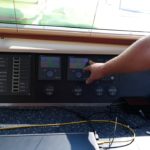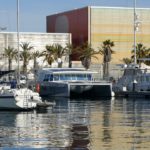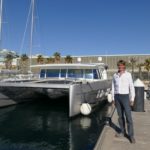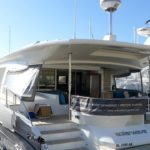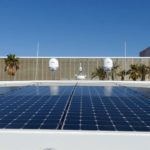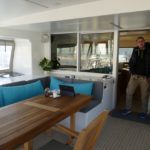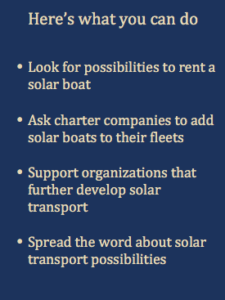Solar All the Wa(y)ve (GRC)
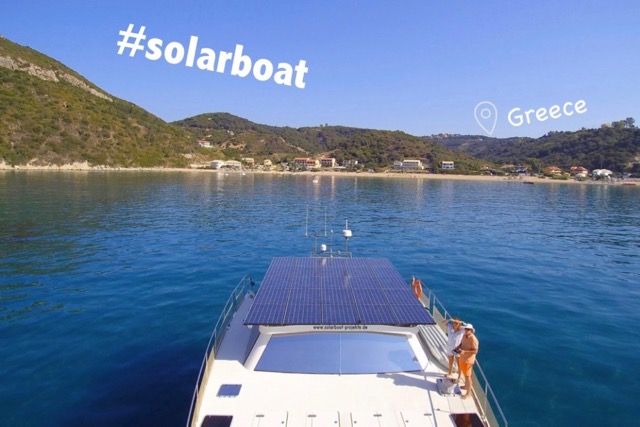
Has the future of motor boating arrived? After meeting both a prototype and a commercial solar boat we surely think so!
Contributes to achieving the following UN Sustainable Development Goals:
“So much wind, much more than predicted!” Ivar shouts while our boat lists and a large wave washes through the gangway. “Let’s put another reef in the mainsail.” For our crossing from southern Italy to the Greek island of Corfu, we need to pass the Otranto Strait. Both sides of the narrow strait are mountainous, which causes the northern wind coming from the Adriatic Sea to accelerate significantly. Even with our reefed sails, we list considerably as we plough through the waves at high speed. Water flushes over deck. Still, we are not too worried, because our sturdy steel boat can handle this. Yet it sure isn’t comfortable.
We don’t catch any meaningful amount of sleep, so we are both exhausted when in the morning we see the mountains of Corfu slowly getting bigger. When we get close to the island, the wind and waves first diminish and then disappear altogether as we enter a sheltered bay. The water is azure blue and so clear that from the deck we can see our anchor falling on the sandy bottom. The white beach, the bright green mountain slopes and multi-coloured houses make us quickly forget how tough the sailing trip was. We have arrived in the Ionian Sea, an area known for its sunny and windless climate.
Striking Neighbours
It doesn’t take long for our eyes to fall on our neighbours’ boat. “A catamaran without a mast,” Floris observes. “It says SolarWaveon the side.” Our curiousity awakened, we paddle closer in our kayak and discover that the whole roof is covered with solar panels. We have not seen anything like this before. Before we can say something, the skipper and his wife address us. Falk and Susanne Viczian have seen our flag, found our project on the internet and are as curious about us as we are about them. An invitation for sundowners and dinner follows, which we gladly accept.
A Unique Prototype
We’re in luck. Falk turns out to be an engineer and founder of Solarboot Projekte, an organisation focused on solar boating. When their boat, the SolarWave, was launched, it was the first solar boat of its kind in the world. Falk works together with various educational institutes to further optimize the systems on board. Trainee Andrea Schmid from the Regensburg College of Applied Sciences is helping with the research. Falk’s wife Susanne is on board for a few weeks’ holiday.
We get an extensive tour. On the roof of the catamaran we count no less than 25 solar panels. “The power peak is 8,500 watts and on an average day they generate 50 KWh. This means that not only the electric motors can be powered, but also kitchen appliances, the water maker and all other equipment on board,” Falk says enthusiastically. Yet in the technical room we only see two big batteries. Surprised we ask where the rest of the batteries are. “This is all there is. On this solar boat we use the energy supplied by the panels directly for propulsion. That is an important difference with an electric boat, where a large battery bank is important for energy storage. We mostly sail during the day,” Falk smiles.
A little later, Susanne spoils us with delicious cocktails while we watch the sun go down. When it is dark, she conjures a 5-course meal from the kitchen. Over dinner, Falk summarizes the concept for us. “The SolarWave is actually a research station to further improve the use of solar energy on board ships. Solar panels have improved so much in recent years that enough space is available on a catamaran to power the boat and to run all on board systems fully on solar energy.”
Sunny Test Drive
The Ionian Sea is a very suitable test area for the SolarWave: there is plenty of sun and little wind. As there is not enough wind for us to sail, we are staying put for a while. “Will you guys join us for a test drive?” Falk asks the next morning. Sure! We leave Luci alone at the anchorage and see her getting smaller as we sail away aboard the SolarWave.
While we glide through the azure water with a speed of five knots, we enjoy not having to sail ourselves for once. And there is even more luxury: we can do our laundry with fresh water from the water maker while Andrea bakes bread in the electric oven. All on 100% solar energy! We are very enthusiastic about the silence, the steady pace and the absence of CO2emissions and other exhaust fumes. We realize that the future of motor boating seems to have arrived. “I think so too,” Falk nods his head. “And I’m not the only one. The solar catamaran has been taken into production by a commercial shipyard.” Does this mean we’ll soon see other solar boats on the water?
A Solar Record Attempt
A few months later we moor in the Spanish port of Cartagena. In the harbour we immediately notice a catamaran with a solar panel roof and the Solarwave 62 on the side. Could it be…? Owner Samuel Voetter confirms our suspicion: his catamaran is the first serially built Solarwave.
Samuel invites us on board and shows us around. The ship reminds us a lot of Falk’s SolarWave, but it is larger and has a more luxurious interior. There is also a big battery bank, so the boat can sail at night. We are curious why Samuel bought this boat. “The idea of being independent of fossil fuels appeals to me because they are polluting and finite.” Honestly he adds that there is also a diesel generator on board in case more energy is needed, for example when the sky is overcast. “But we are going to make a record attempt to cross the Atlantic Ocean on solar energy only!” Samuel announces, enthusiastically. We hope that he succeeds in setting a new, sustainable record in motor boating.
The Boat of the Future?
As sailors, we are happy that we can use wind energy, an indirect form of solar energy. Yet we have noticed that a lot of sailboats don’t use their sails, and not only in the Ionian Sea. The diesel engines of many chartered sailboats throughout the Mediterranean work overtime. In addition, catamarans seem to have become more popular than monohulls; they offer more comfort and space for more people. Therefore, solar catamarans certainly seem to meet a need. Has the motorboat of the future already arrived? Time will tell, but it seems to us that these pioneering solar boats are ringing in a new era of marine leisure transport.
Related Sustainable Solutions

Solar Boat (GRC)
Has the future of motor boating arrived? After meeting both a prototype and a commercial solar boat we surely think so!

Fair Transport (PRT)
In Porto we moor next to Fair Transport’s sailing cargo vessel Tres Hombres. Their mission: to promote emission-free transport and to minimize transport.
